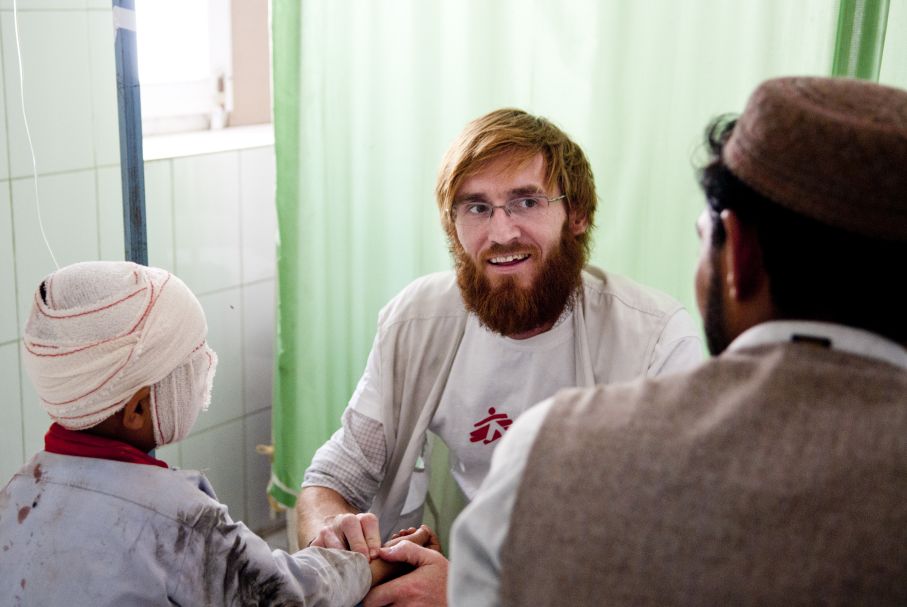Afghanistan: Healthcare in Helmand

Aug 24, 2011
In recent years, Afghanistan’s Helmand province has seen some of the bloodiest and relentless fighting in the whole of the country. Large numbers of people have been displaced, and for most, accessing medical care remains a constant challenge. Faced with such enormous needs, Médecins Sans Frontières(MSF) commenced work at Boost hospital in Lashkargah, the capital of the province, a year and a half ago. The 155-bed hospital is now one of only two fully functioning referral hospitals in the whole of southern Afghanistan.
Stefano ARGENZIANO, MSF Field Coordinator
In the past month, we’ve conducted around 6,500 consultations in the outpatient department, and around 2,300 consultations in the emergency room. Those numbers are why MSF is here. They’re a good indicator of just how big the needs are in this city, as well as in the rest of the province.
What we’re doing here is what you’ll see being done in an emergency facility anywhere in the world. We’re treating people on the spot, providing observation capacity and referrals for surgery for patients who require it, or dealing with any other medical problem they present with.
Jomar STAVERLOKK, Nurse supervisor
There is no proper healthcare here in Helmand. Children here die of diarrheal diseases; they die of measles, dehydration, and respiratory tract infections. Sometimes it’s hard to be in the emergency room, watching patients die with these kinds of illnesses when you know you could have treated them so easily if they had just come earlier. One of our aims at MSF is to catch these things before they become severe.
Stefano ARGENZIANO
There are strong medical reasons for MSF to be here, but it’s our neutrality and impartiality that allows us to continue to operate here. Helmand province is controlled partially by governmental forces, but is mostly under the control of armed opposition groups. That means it’s difficult for the local health authorities to run a proper health service in this area, and it makes it very difficult for patients to access the few health facilities that do exist. But we don’t accept government funding for our work here, which is what allows us to continue to operate and save lives.
Amina*
I’m here with my daughter who is pregnant. We travelled about three hours to get here because my daughter is anaemic and we’re afraid she will lose the child. We’ve been to many different places for treatment, but we couldn’t find any place to treat us. There is a hospital near us, but if you try to go there, people try and stop us on the way…They always ask ‘Why are you going to the doctor?”
But we heard there are good doctors here, so we made the trip especially. This is the only place we can come. We want to get treatment here so my daughter can have a healthy child.
*Name has been changed.
Stefano ARGENZIANO, MSF Field Coordinator
In the past month, we’ve conducted around 6,500 consultations in the outpatient department, and around 2,300 consultations in the emergency room. Those numbers are why MSF is here. They’re a good indicator of just how big the needs are in this city, as well as in the rest of the province.
What we’re doing here is what you’ll see being done in an emergency facility anywhere in the world. We’re treating people on the spot, providing observation capacity and referrals for surgery for patients who require it, or dealing with any other medical problem they present with.
Jomar STAVERLOKK, Nurse supervisor
There is no proper healthcare here in Helmand. Children here die of diarrheal diseases; they die of measles, dehydration, and respiratory tract infections. Sometimes it’s hard to be in the emergency room, watching patients die with these kinds of illnesses when you know you could have treated them so easily if they had just come earlier. One of our aims at MSF is to catch these things before they become severe.
Stefano ARGENZIANO
There are strong medical reasons for MSF to be here, but it’s our neutrality and impartiality that allows us to continue to operate here. Helmand province is controlled partially by governmental forces, but is mostly under the control of armed opposition groups. That means it’s difficult for the local health authorities to run a proper health service in this area, and it makes it very difficult for patients to access the few health facilities that do exist. But we don’t accept government funding for our work here, which is what allows us to continue to operate and save lives.
Amina*
I’m here with my daughter who is pregnant. We travelled about three hours to get here because my daughter is anaemic and we’re afraid she will lose the child. We’ve been to many different places for treatment, but we couldn’t find any place to treat us. There is a hospital near us, but if you try to go there, people try and stop us on the way…They always ask ‘Why are you going to the doctor?”
But we heard there are good doctors here, so we made the trip especially. This is the only place we can come. We want to get treatment here so my daughter can have a healthy child.
*Name has been changed.





Leave a Comment